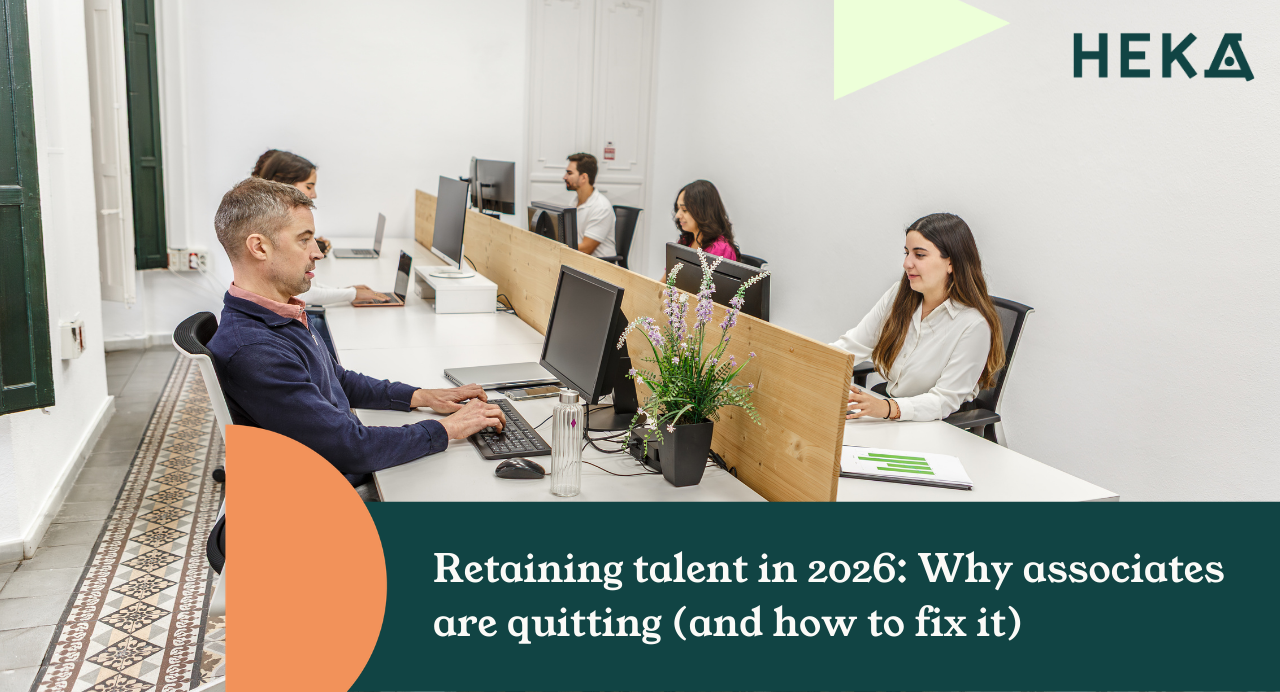A quick summary:
- Work life balance meaning
- Heka's work life balance definition
- Why does it matter anyway?
- How to encourage better work-life balance
- Our conclusion
Work-life balance is essential for everyone, regardless of job role, seniority or industry — it's a huge factor of social wellbeing. We all need time to step back and focus on ourselves. Not only does it benefit our personal wellbeing, but also the success of our company, or that of an employer.
To put it simply, work life balance is a win-win all around. Despite this, thousands of businesses misinterpret work-life balance to mean ‘working less’. That’s exactly why we’ve produced this guide to work life balance; helping leaders see past the gloomy reputation it so often receives.
By the end of this, we hope you’ll have a completely different outlook on work life balance — after all, it’s the ingredient to a healthy and happy workforce.

Work life balance meaning
As we often do here at Heka, let’s kick things off with a work-life balance definition. According to the team over at HRZone, work-life balance is best described as “the level of f prioritisation between personal and professional activities in an individual’s life”.
Their definition goes on to discuss how much these professional activities are present at home. And although HRZone’s overall definition of work-life balance is very sound, it doesn’t reflect the modern workplace, entirely.
Heka’s definition of work-life balance
It’s only right that we put our own spin on the work-life balance meaning. So, what does it mean to us here at Heka? We believe work-life balance refers to the ability one has to balance both their personal and professional life.
It’s the lengths they go to prioritise their health and wellbeing, especially in an active sense against the pressure, stress and burnout of modern society. It’s recognising when to get down to business, but also knowing where to draw the line.
If employers fail to promote work-life balance, these stress and pressures can spiral into workplace conflicts and poor workplace relationships. People can't be expected to work effectively if they are constantly burnt out and stressed.
And although it’s our own responsibility to live a healthy lifestyle, employers should be encouraging positive behaviours in their workforce. On that note, let’s just into our first section — why work-life balance is the essence of a happier team.

Why does work-life balance matter, anyway?
Although we’ve covered what work life balance is, we haven’t discussed the reasons to take it seriously. Below, we’ve detailed a few reasons why it matters even more so in today’s workplace.
The world is always on
This point doesn’t reveal any secrets, nor does it really deliver anything you don’t already know. But it’s an issue that must be addressed.
In modern times technology has helped many industries with many problems. For HR departments, it’s automated hundreds of processes, that otherwise would have taken a lot of time.
Unfortunately, it hasn’t come without a cost. Society has now adopted an “always-on” culture. We’re now bombarded with notifications, work emails and instant messages, likes, shares, and more.
This kind of connectivity has created a culture driven by burnout. Rewind just a couple of decades ago, and it wasn’t extremely unlikely you could access your work emails or even complete tasks from the comfort of your home.
Now, ‘bringing work home’ is less of a thing, because for many employees, work is already at home, and those deadlines are staring us straight in the face.
Work-life equals healthier lifestyles
Despite a huge tendency to overwork, burnout and “hustle, hustle, hustle!” work-life balance generally appeals more to modern society.
That’s because healthier lifestyles are becoming more popular, especially with younger generations who are notably health conscious. According to one report, 69% of millennials and 66% of Gen Zs say they “think about their health every day”. Compared with other generations, who were considerably lower.
Because of this trend in healthier living, employers must consider how they are helping people lead more balanced lifestyles. Whether that’s by offering remote work or reviewing deadlines more often, better balance must be prioritised.
Employees work harder when they aren’t burnt out
Finally, let’s talk about hard work. Believe it or not, hard work and excessive work are not the same. While working longer can mean getting projects over the finish line, the long-term implications can negatively affect wellbeing, and make us more prone to mistakes.
Our brains are not meant to be so actively engaged in problem-solving and producing the highest standard of work over and over again. It’s completely normal to need to take a break or even some annual leave to rejuvenate.
We actually work best when we’re in the best possible mind frame. That means not suffering from burnout, not feeling under pressure and not feeling unhappy with our circumstances. Ultimately, by creating a culture of health and wellbeing, leaders can increase productivity, performance and the overall success of the company.
According to a study carried out by Warwick University, United Kingdom, we are 12% more productive when we’re in a positive mood. Dr Sgroi (involved in the research) discovered that we’re able to focus on a task at hand and produce results without sacrificing quality at a quicker pace when we’re happy.
If this isn’t enough to convince you that work-life balance is a must-have for your workforce, we don’t know what will! Now let’s turn our attention to ways to encourage better work life balance for your team.

How to encourage better work life balance
We’ve included, what we believe to be some of the most important ways to encourage better work-life balance. Remember, this list is by no means exhaustive, and there are plenty of initiatives, ways of working and other ideas to consider.
The best route of action is to assess your own workforce and their needs. You will find the most effective solutions by speaking directly with your team.
Similar read: Signs of bullying in the workplace and how to stop it
Set realistic deadlines
Deadlines are a must. They help us on track. The problem many organisations face is setting unrealistic deadlines. The kind that not only impacts work-life balance for some employees but creates uninspired and demotivated employees.
That’s right, done incorrectly and your deadlines can have major consequences for the productivity and performance of your team. We recommend that you, as a leader, set realistic deadlines.
To do so, consider some of the following questions. Put yourself in the shoes of your employees and only then can you assess whether they are fair or not.
- Can I complete this task to the best of my ability within the given deadline?
- Are there any factors that are out of my control and may slow me down?
- Will this project likely impact my work-life balance?
- Is this project beyond what I’m capable of?
These questions should help you understand the kind of concerns your team may have. It’s worth thinking about how a project, task or deadline may weigh down on your employees. We recommend you start by asking them what deadline they believe it will take. That way, you can make a decision by what your employees feel comfortable with.
Create a strict ‘no working during unsociable hours’ policy
With the rise of remote work, employees are finding it harder to disconnect. According to WorkplaceInsight.net, a survey of 200 remote professionals found that 40% think the biggest challenge with remote work is unplugging after the day.
This is a very real problem and one leaders must address. As we’ve mentioned previously, poor work-life balance leads to poor overall social wellbeing and perhaps emotional wellbeing. If leaders want to increase productivity and performance, they must discourage working outside of ‘office’ hours.
With employees working longer, unsociable hours, loneliness is likely to increase as they spend less and less time with friends and family. Remember, it isn't just company productivity and performance at stake here, it's the personal health and happiness of your people.
While that’s the case, it can’t be ignored that sometimes tasks require our attention after the clock strikes five, and this is okay every once in a while. But when overworking becomes a regular thing, it’s bad news.
Having friendly conversations with your team on why it’s not a good idea to overwork is great practice. Let them know that if they need help with deadlines, it can be rescheduled, or another member of the team could get involved to push it over the finish line.
It's also worth considering a wellbeing day for employees. The opportunity to step back from deadlines and Zoom meetings for focus on our health and wellbeing without reason or explanation.
Consider an employee wellbeing platform
Can work-life balance really exist without an employee wellbeing platform? That’s for you to decide, but we’d say it most certainly helps. Consider Heka, we’re an employee wellbeing platform that’s host to more than 3,000 experiences across 50+ categories.
There’s plenty to choose from, in fact, there’s something for everyone in your team. However, with some of our experiences requiring users to take time from their day, be it the week or weekend, it’s a great way to encourage work life balance.
For example, our users can book from GoApe, breathwork training or an hour slot at a spa. It’s these kind of experiences that encourage better work-life balance, making Heka a great choice for employees.
Refine the entire employee experience
Finally, let’s talk about refining the employee experience. Your employee experience is a combination of things. It’s how you hire, onboard and nurtures the relationship between the workplace and the workforce. It’s important you get this right, as a poor employee experience (EX) can leave the best of talent running for the door.
While your employee experience should be an ongoing process of refinement, there is one thing it should always take into consideration; are you create a culture of health and wellbeing. In this case, are you taking the work-life balance of your team seriously?
Think about your benefits package, any learning and development opportunities or other areas of the operations in the business that may need improving. To begin with, your employee benefits package may want to be revised to include more wellbeing experiences.
As for learning and development, it may be a good idea to let employees take a couple of hours each week to focus on this. That way, they’re not spending all their free time on L&D. For some businesses, this just doesn’t seem like a feasible idea, however, learning and development is an investment in your people.

Our conclusion on work-life balance for employees
There you have it! Our ultimate guide to work-life balance. Hopefully, you’ll have a greater understanding of the reasons why it’s important and ways to encourage healthier lifestyles. It’s worth remembering that when your team are healthier and happier, your business follows suit.
If you want to succeed, your team, department or business must be led with a people-first approach — one that takes employee wellbeing seriously and wants what’s best for everyone. An effective employee benefits platform is essential for employee wellbeing. It’s people that ensure businesses achieve great things, and it’s something leaders must remind themselves of when working on company culture.
The remote-first workplace is making work-life balance extremely difficult, but that’s not to say businesses can be and should be supporting their teams. How are you going to improve work life balance?






